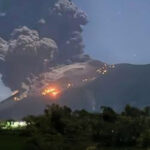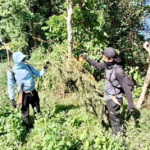President Rodrigo Duterte said on his public address on Friday, that he “might declare martial law” if the communist rebels would continue to commit chaos while the government was struggling to fight the coronavirus disease 2019 (COVID-19) pandemic.

Duterte warns the continuous killing of soldiers by the New People’s Army (NPA).
The president said, “Kaya ngayon, ‘pag nagpatuloy kayo ng lawlessness ninyo, patay dito, patay doon, and it’s happening all over the Philippines, maybe I will declare martial law because kayong mga NPA ang numero uno (you NPAs are instigators).”
He added, “Kinukuha ninyo ‘yung mga tulong sa tao pati ‘yung supply pagkain nila. Kaya I am now warning everybody and putting notice sa Armed Forces pati Police, I might declare martial law and there will be no turning back.”
“Ang utos ko sa kanila, ‘Patayin kayo? O di patayin ninyo sila.’ Lahat na. Tapusin na natin ito sa panahon ko . I have two more years. I will try to finish all of you,” he said.
He vowed to “finish” all of the communist group members before his term ends in 2022. This was after two soldiers were killed by the NPA at on Tuesday at Aurora province.
The Philippine Army had identified the fatalities as Pfc. Ken Lester I. Sasapan and Pfc. Jackson M. Mallari, based on his statement.
The Army said, ‘Sasapan and Mallari’ were part of the Scout Platoon from the 91st Infantry Battalion, 7th Infantry Division conducting a security patrol in the vicinity in relation to the distribution of the Department of Social Welfare and Development’s Special Amelioration Program.
Despite the government has declared the ceasefire between the government forces and NPA’s until April 30, still, there have been a number of clashes that happened.
Palace spokesman Harry Roque Jr. said that the discussion of the proposed extension on Ending Local Armed will be decided by the National Task Force.
The country’s communist rebels have been waging Asia’s longest-running communist insurgency. The rebel group is listed as a terrorist organization by the Philippines, the United States, the European Union, the United Kingdom, Australia, Canada, New Zealand.
What can you say about this? Share it in the discussion box below.







